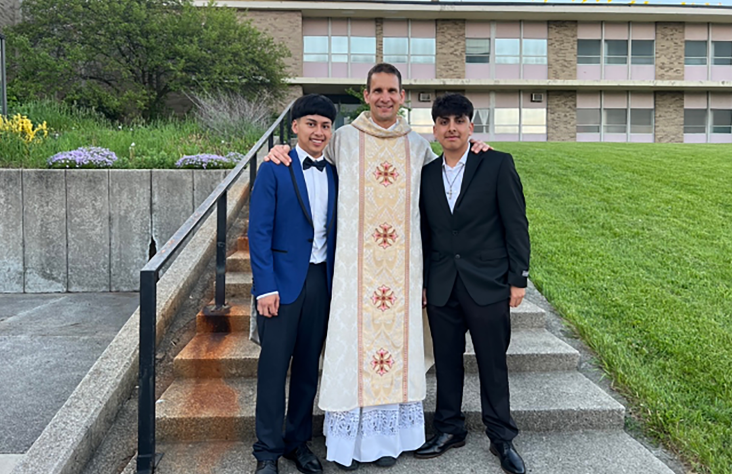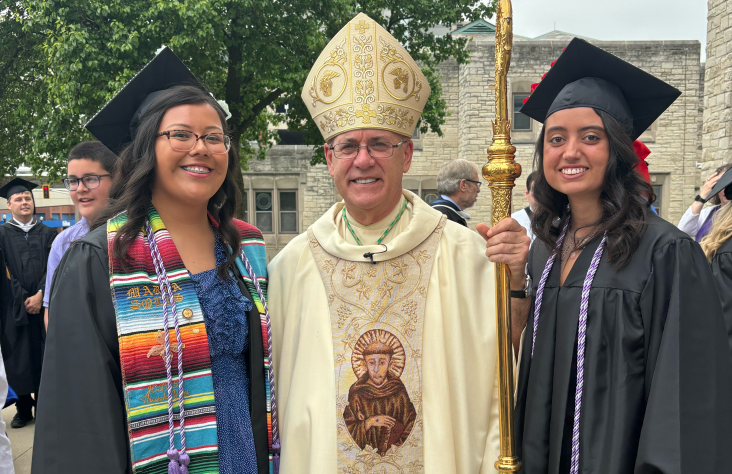May 9, 2017 // Special
The many ways Catholic Charities serves mothers, families

The Catholic Charities ECHO program helps teen moms graduate from high school, so that they can parent successfully while they continue their education. — Provided by Catholic Charities
Editor’s note: In honor of Mother’s Day, we asked Catholic Charities about the many ways the church’s social-service arm is serving mothers in our diocese.
As Bishop Kevin Rhoades reminds us, what is distinctive about Catholic Charities is that, “…we operate from the perspective of our Catholic faith, our beliefs and moral teachings. The work we do is a response to Christ’s commandment to ’love one another.’”
Of the more than 18,000 people served by Catholic Charities last year, the majority are women, many of whom live below the poverty level. In fact, the single greatest predictor of poverty in America today is a single mother with children. In an effort to combat this, a number of Catholic Charities’ core programs serve mothers and their families. Given the complex, long-term issues that many face, they often require years of professional support to achieve greater independence.
Listed below is a sampling of programs administered in the Diocese of Fort Wayne-South Bend that help improve outcomes for women and children.
1. Your Journey Together is a program in which moms learn techniques for supporting the social and emotional well-being of their children, including better managing conflict within the family. This highly successful program also allows mothers to grow in their understanding of the emotional and psychological needs of their children
2. ECHO (Education Creates Hope and Opportunity) is dedicated to helping teen moms complete their high-school diploma or the equivalent. This program has a more than 90 percent graduation rate (compared to 40 percent nationally) and has served 985 participants since 1998. In addition to a better quality of life, each graduate saves taxpayers an estimated $600,000 in government support services. Children see in their teen parents positive role models, a factor critical to helping them break the cycle of poverty.
3. Catholic Charities provides pro-life counseling for pregnant women who are unsure if they can successfully parent their unborn child. For these clients, the organization provides free, professional services through its masters-level therapists. If she decides to parent, Catholic Charities will wrap her in services to ensure the safety and wellbeing of mother and child. If she chooses adoption, it is a licensed child-placing agency that can help her facilitate the entire process.
4. Catholic Charities’ Youth Mentoring Program is designed to prevent delinquency, truancy, drug use, gang involvement, pregnancy and other high-risk activities while improving school performance. Targeted to at-risk youth between the ages of 9 and 17, the program pairs trained adult volunteers with young people to form nurturing relationships. The program is supplemented with group recreational activities as well as case management and other assistance provided by Catholic Charities’ professional staff.
5. The organization’s refugee services address those who have been persecuted and displaced from their homes. Many are tortured, falsely imprisoned or separated from family through no fault of their own. The same is true for the vast majority of those served in the Legal Immigration Services Division. The difference between the atrocities experienced by refugees and immigrants is often related to who is inflicting the harm. Almost all refugees and immigrants are fleeing abject poverty on a scale most U.S. citizens have not experienced. More often than not, the victims of these cruelties are women and their children.
6. Parish priests and Catholic schools tell Catholic Charities that emotional and mental health counseling are badly needed services, so this program is being expanded throughout the diocese. Addressing the situation began with a licensed therapist in Catholic Charities’ South Bend office; this therapist is now serving several Catholic schools, with more schools now expressing interest in the same support. Thus far the therapist has been asked to help children who are struggling in the classroom. Almost invariably, the therapist will conclude that involving the parent or parents in treatment is necessary. Single mothers head nearly half of the families referred to this program so far.
7. Senior Community Service Employment Program is for persons 55 and older with special emphasis given to veterans, people with disabilities or those leaving prison. SCSEP provides job training and coaching. Clients, who work for nonprofit host-agency partners, receive on-the-job training and supervision while the host agency receives these services at no cost. After the training period, a professional case manager and job coach assists the client to find permanent employment. Some of the people served in SCSEP are motivated to go back to work, perhaps for the first time in their lives because they are caring for grandchildren when their adult child cannot.
8. Catholic Charities’ Hispanic health advocates serve clients for whom English is a new language. A case manager helps women navigate the health care system, while health care providers also benefit by having a certified medical translator at no cost. Many people served in this program would otherwise have medical health needs, some of which are life-threatening, go untreated.
9. The Food Pantries and Resource and Referral programs predominantly serve mothers and children. They temporarily provide for basic needs such as food, rent, mortgage, utilities, clothing, hygiene products, transportation, childcare and other needs that are ongoing.
Gloria Whitcraft is CEO of Catholic Charities, Diocese of Fort Wayne–South Bend.
______________________________________________

Catholic Charities’ Your Journey Together program helped Shontel recoup a good relationship with her sons following a tough family situation.
Shontel benefits from Catholic Charities’ Your Journey Together program
In November of 2014, Shontel’s life took a turn for the worse. She lost her job, got behind on her bills, and eventually she and her two sons found themselves homeless. With no car and an impending bankruptcy to compound matters, all the stress in their lives put them on edge.
“There was a lot of bickering and fighting,” Shontel said. “It was a very ugly.”
After a brief stint in a motel, the family went to the Vincent Village homeless shelter. Because of the turmoil that preceded their arrival, tensions grew between Shontel and her sons. The strain showed up at home with more conflict, and at school with more calls about her son’s behavior.
The people at Vincent Village recommended a program called Your Journey Together. A service administered by professional case managers at Catholic Charities, YJT is a curriculum designed to promote the social and emotional resilience of children and their families.
“I wasn’t sure about it at first,” said Shontel. “But with my case manager’s help, I’ve seen a complete change in my sons.”
Resilience in children helps them cope with change and adversity, and, in the process, experience more positive outcomes in their lives. Through the YJT curriculum, Shontel learned the techniques that would enable her to be a better parent. The first task with YJT is to understand that all experience fits into a figurative suitcase. The contents of one’s suitcase determine outcomes in life.
“Our experiences define us,” says YJT Case Manager Megan Brendell. “Negative experiences produce negative outcomes, while positive experiences produce positive outcomes.”
Through this course, Shontel learned techniques for better managing conflict as well as growing in the understanding of the emotional and psychological needs of her sons. In turn, this understanding helped her create a more positive environment for her kids so she could begin building resilience in them.
“To be resilient, kids need to have confidence,” said Megan. “This program gave Shontel the tools to build confidence in her children.”
YJT teaches parents how to create a positive environment by giving kids structure, well-defined expectations, and affirmation of their strengths. The program also teaches parents how to set boundaries and diffuse tensions when they arise.
Thanks to YJT, Shontel is now better able to help her sons cope with challenges and set backs so they can reach their full potential. All of this works in service of her main goal, which is to be a loving mother, who is raising her sons to be successful.
“Even though we are still homeless,” says Shontel, “I’m thankful because I’ve got the most important thing — a better relationship with my kids.”
— Provided by Catholic Charities
The best news. Delivered to your inbox.
Subscribe to our mailing list today.





